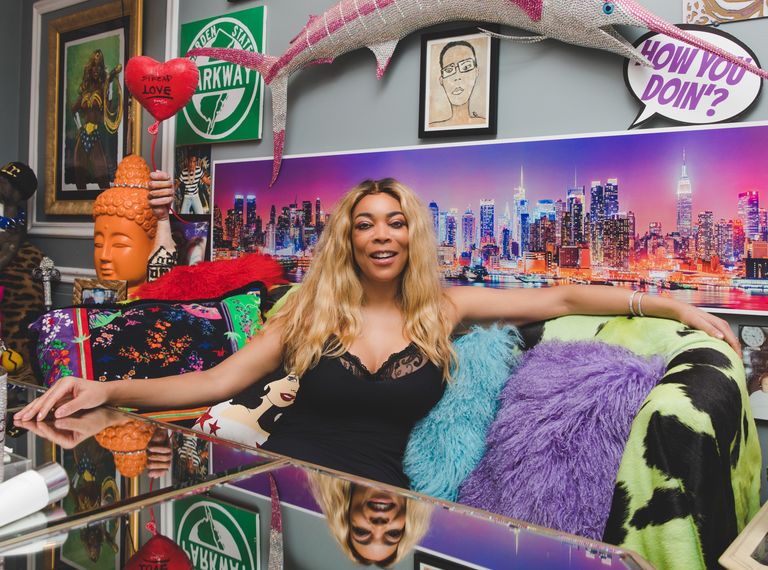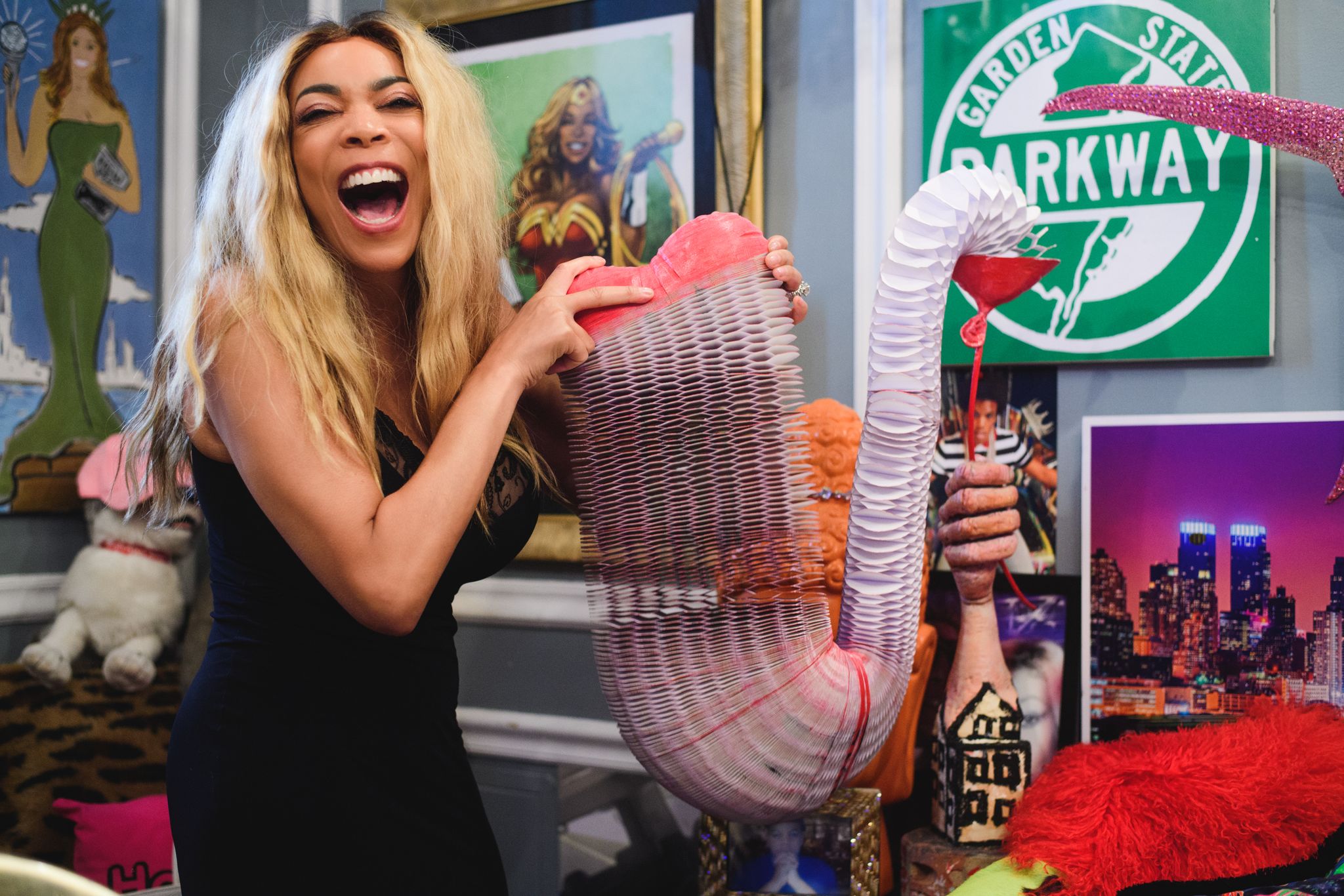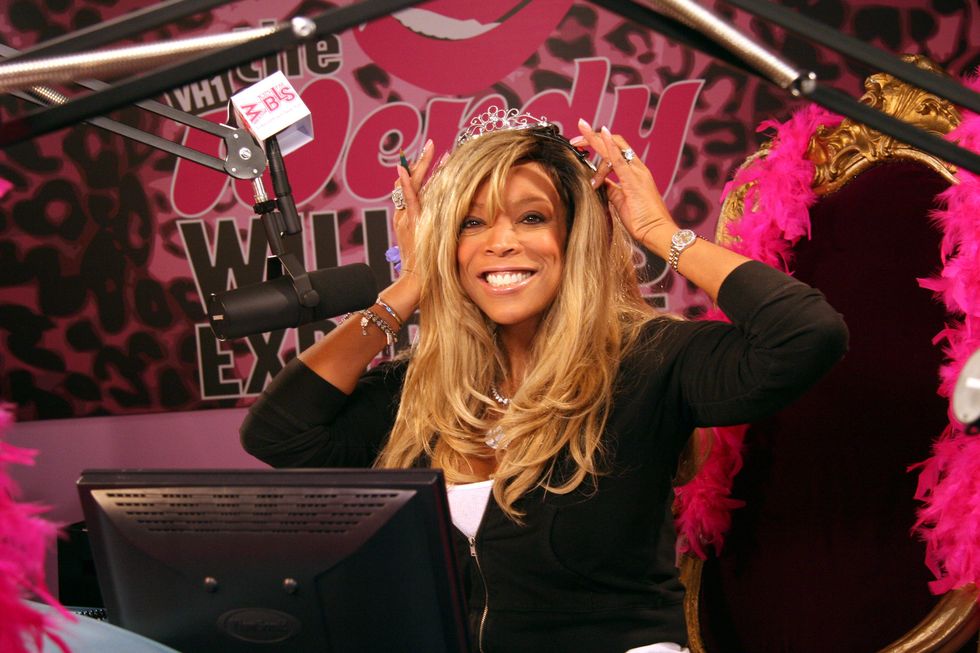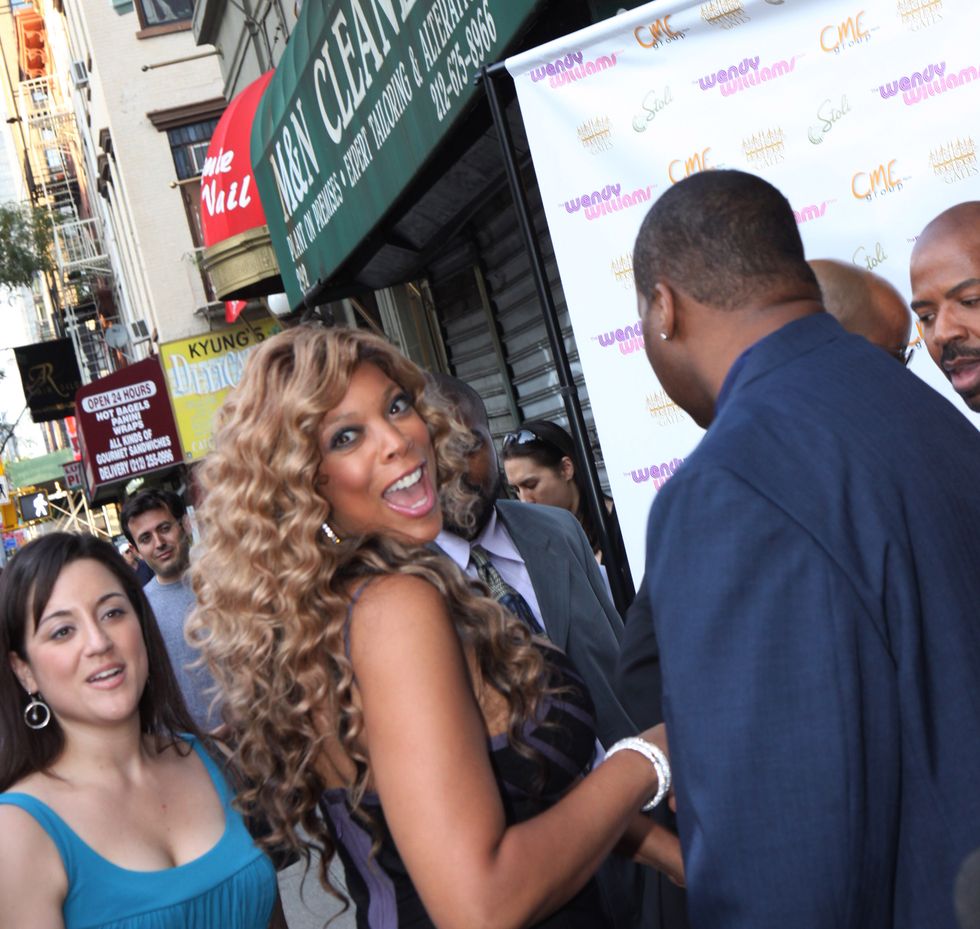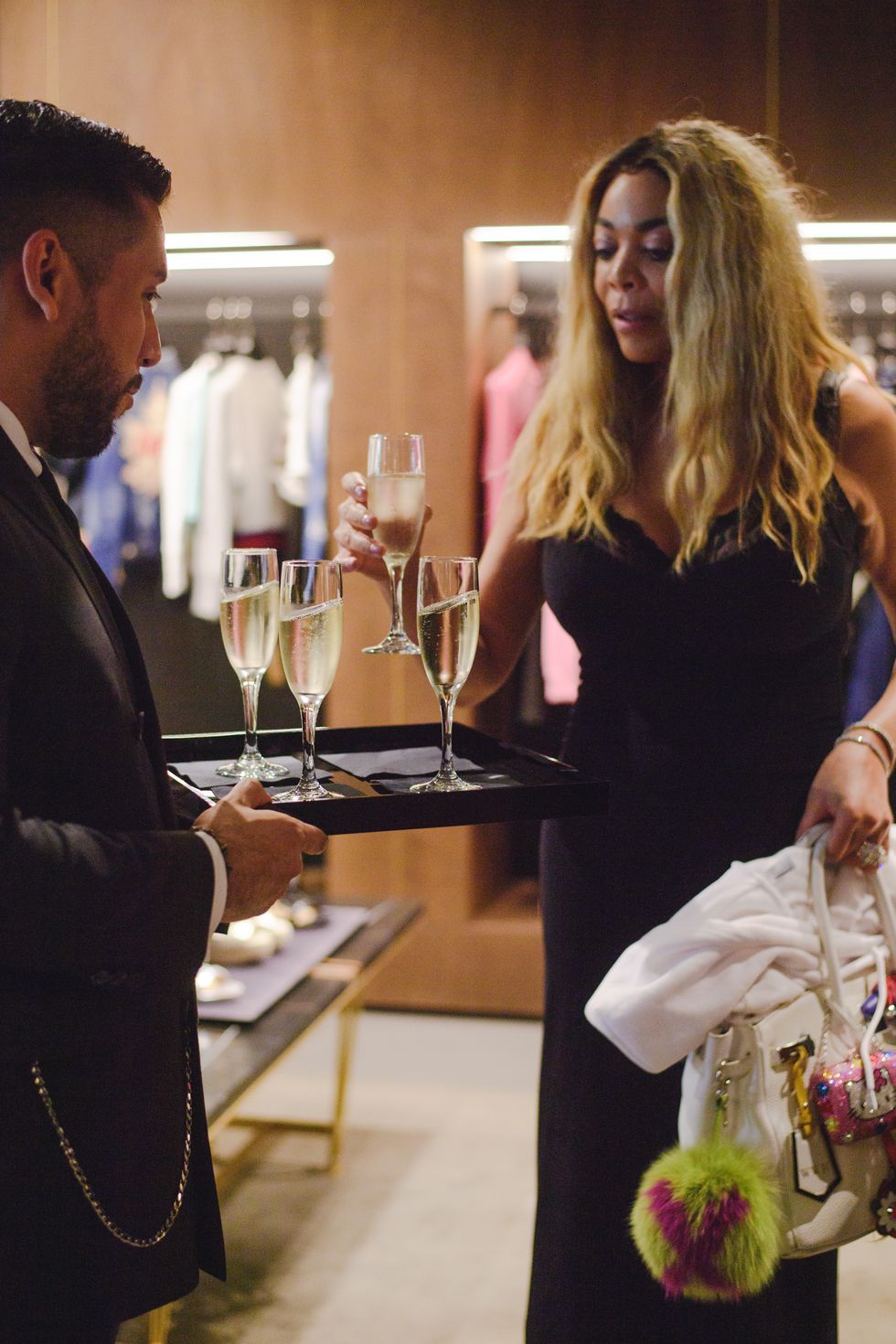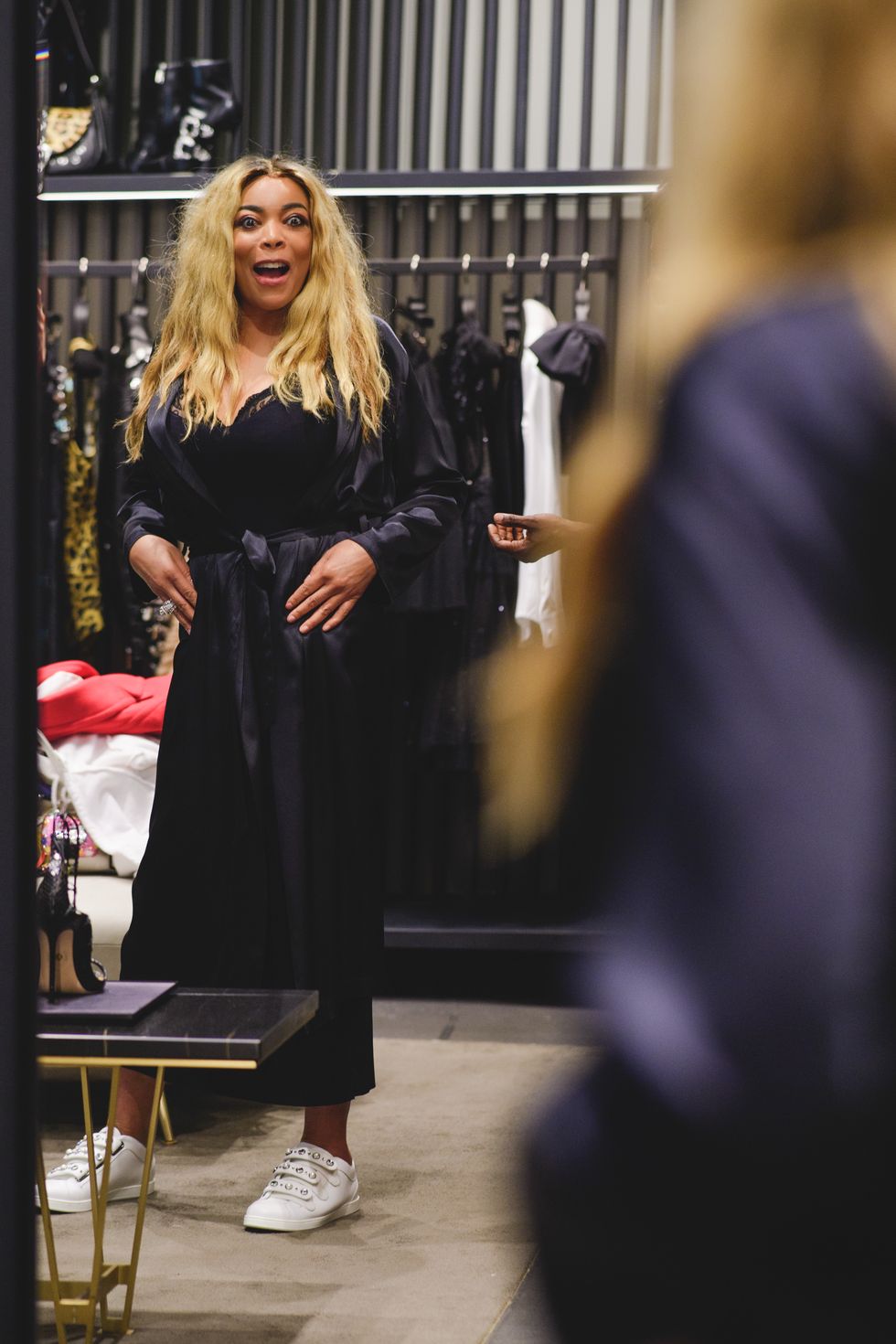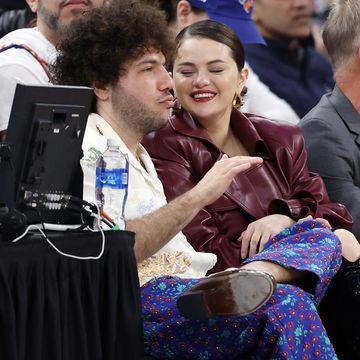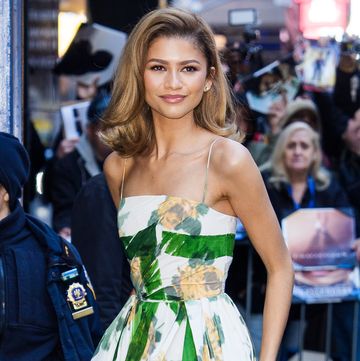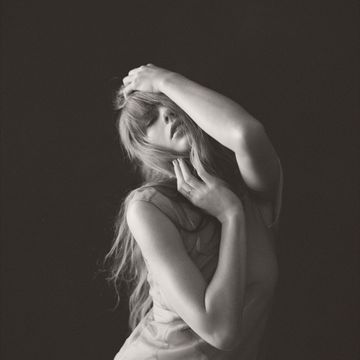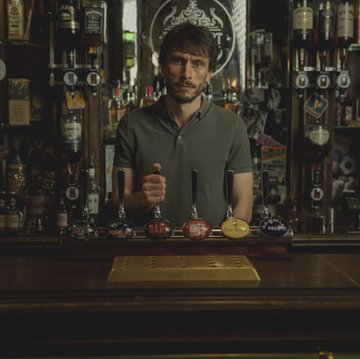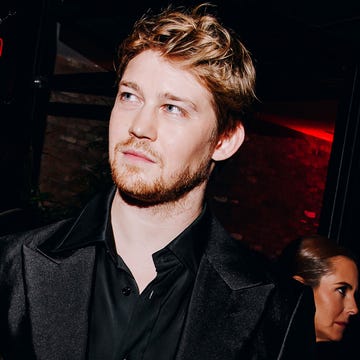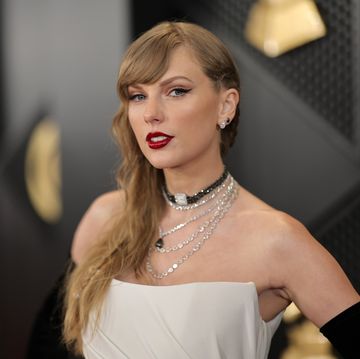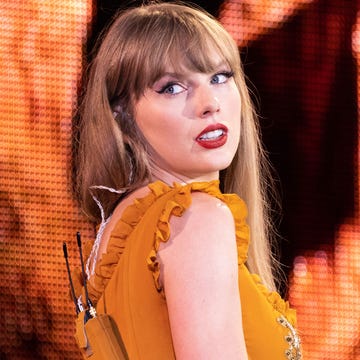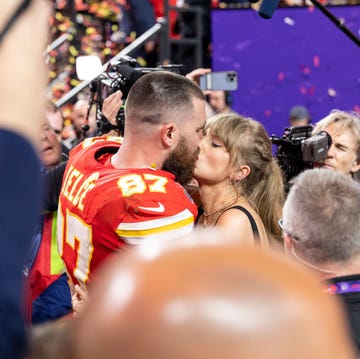I enter the studio home of The Wendy Williams Show—a hulking, nondescript warehouse tucked behind New York City’s Fashion Institute of Technology—before the audience files in, and sit alone in the center section, awkwardly, as the crew bustles around me. The show’s house DJ is already blasting Cardi B, Bey, Nicki, and Drake at midnight-on-the-dance-floor decibels. It’s 9:30 in the morning.
Actually, sorry: In the parlance of The Wendy Williams Show, it’s not “the audience.” Williams calls her viewers—both those at home and in the studio—"co-hosts,” reflecting the gossipy, kaffeeklatsch nature of her hit show. Today’s 100 or so co-hosts started lining up outside around 8 a.m. They’re dressed to impress in girls’-night-out gear: hair done, full face, and fierce footwear ready to be featured on the show’s Shoe Cam. As is par for the course in daytime television, the attendees are overwhelmingly female, but the women here aren’t your standard daytime-talk-show audience. Behind me sits a black woman in her twenties from Birmingham, England; in front of me, a trio of white women from North Carolina. An elderly woman with her arm in a sling dances past me as Beyoncé’s “7/11” plays. Oh, and there are nine women wearing tiaras, because this is The Wendy Williams Show and everyone is hype.
But not hype enough. Marco G, a built black man with shoulder-length dreads who serves as the audience producer (read: preshow hype man), comes tearing out from the backstage, microphone in hand, and runs up to a woman in the front row with such speed and force that I initially think he’s going to attack her. Instead, he stops short, gets in her face, and yells, “You ready?” I am not ready.
Suddenly, Marco G has us on our feet. He wants us to clap to the beat. He wants to hear our best How you doin’?—Wendy’s trademark phrase. He wants us to put our arms around the person next to us. He wants us to high-five the person in front of us. He can’t hear us scream! He needs to hear us scream! He’s gotta hear us scream! “Sit down! Clap your hands! Stand up!” We’re doing burpees at The Wendy Williams Show. “Who’s ready for a drink?!” he bellows. He’s giving away a plush bathrobe. He doesn’t like one woman’s enthusiasm. He grimaces at her. He doubts her commitment to Sparkle Motion. He wants to see our hands in the air. He’s jumping on the stairs. He likes the way we move it. He bounces his pecs as a reward. He needs volunteers for a twerk contest. He can’t hear us! It’s only 9:45 a.m. and I am already hoarse. My hands hurt from clapping.
Suzanne, one of the show’s producers, emerges. She can’t hear us either! This seems to be a pervasive problem. She wants another How you doin’? She reminds us that we’ll be on camera. She admonishes us not to look at the camera. She tells us she’ll be standing just beside the camera and we should watch her for reaction cues. When she laughs, we laugh. She gives us a ha-ha-HA. We go, “Ha-ha-HA!” She draws in a breath in surprise. We gasp in response. She groans in disapproval at some imagined news of a celebrity ne’er-do-well. I channel aimless outrage and give a sour harrumph back.
Another producer tells us we go live in five. I have felt every emotion. I am very tired.
Then the doors on set part, and there she is, the siren of Schadenfreude, the baroness of the blind item: Wendy Williams. She’s surprisingly chill, sauntering out of the doorway with her hands in the pockets of her black jumpsuit. She stands in the middle of the stage, letting us look at her. “Oow! Oow!” we scream. She shimmies her shoulders a little and flashes her eyes in return. The music is so loud that I have forgotten my own name. There is nothing before this moment.
Wendy withdraws a hand from her pocket and presents it, open-palmed, to the camera. “Thanks for watching,” she chirps.
In the monitor I catch a glimpse of my resting bitch face doing its best. In my pocket, a text message pings from a friend who apparently has the luxury of sitting at home on Wednesday morning. It reads: I see you co-host.
You wouldn’t be able to guess from my eager, sweaty, cheering face, but my journey to co-hosting was relatively brief. Prior to writing this piece, I hadn’t watched an episode of the show. My knowledge was based largely on Can you believe this?! clips circulated by various online fandoms. I knew Williams was popular, but most of what rose to the surface was anti-Wendy. Like the 2011 video of Williams speculating that Beyoncé faked her pregnancy, or the time Williams said that Bey sounds like she has a “fifth-grade education.” Or the 2013 moment when Williams guested on competitor Ellen DeGeneres's show and told Ellen that Kim Kardashian West would end up being a “single mom.” She’s said that R. Kelly is “not a #MeToo” because Aaliyah “voluntarily married him when she was 15 years old.” And before she was a daytime host, back in her radio DJ days, she relayed a gossip item purporting that Tupac Shakur had been raped in jail, prompting Shakur to shoot back with a diss on his track “Why U Turn on Me” (released on his posthumous 2001 album, Until the End of Time). Shakur told DJ Angie Martinez that Williams “disrespected me, my family and what I represent.” The list goes on.
But notoriety is part of her brand, and the co-hosts eat it up. Wendy Williams is a juggernaut, and while some people dislike her, millions of viewers hang on her every word. What may have seemed a risky gambit—a live daytime hour airing in syndication in more than 95 percent of the U.S., anchored by a host best known to urban radio listeners in New York and Philadelphia—has turned into one of television’s sure bets. The daytime talk landscape is littered with “get your life together” shows, food shows, vehicles for celebs to hawk things, news magazines, and court shows; The Wendy Williams Show is all of the above. Since the show’s national premiere in 2009, Williams has frequently jockeyed with Ellen DeGeneres and Kelly Ripa for the top female spot in talk, and at her height in 2016, according to Nielsen, she reached 1.7 million homes daily. These days, The Wendy Williams Show, which has been renewed through 2020, is in fifth place in daytime, behind Dr. Phil, Rachael Ray, The Dr. Oz Show, and Judge Judy.
Today Williams will spend the first 20 minutes on “Hot Topics,” a daily straight-to-camera commentary segment that’s not as much about boldfaced names as it is about messy drama at all levels of celebrity. She muses on Roseanne Barr’s firing after a supposedly Ambien-fueled tweet about Valerie Jarrett: “That’s why you gotta stick with melatonin.” She gives a play-by-play of the Drake-Pusha T beef: “You know what, Rihanna? You dodged a bullet with this joker.” She gives equal time to invitation snubs for Brody Jenner’s wedding: “Kendall and Kylie were both sent invitations, but neither of them RSVP’d to Brody. And then his dad Caitlyn…” She pauses. The audience titters. Wendy gives a blank stare and continues. “His mom Caitlyn…” The audience laughs and applauds. Wendy fidgets and mouths “Mom… Dad…” It’s unclear if this is all for show. She whips around to look at the photo of Caitlyn on the screen behind her. “You know, Caitlyn, if you didn’t know that you used to be Bruce, you are really pulling this look off!”
Later, David Arquette will join her on a couch to plug a documentary. “You’re so nervous!” she’ll declare in his general direction. A chef will demonstrate a gourmet mac-and-cheese recipe. Then Wendy will take questions from the audience. Most days are like this: She holds court on celebrity drama, gives pronouncements, and shares her own past as a way of confirming her bona fides. She’s struggled with her weight and miscarriages; she’s battled drug addiction. Her life isn’t the center of the show, but it lends her a rough authenticity that no other daytime talker can match.
“This show is exactly what I would be watching if I wasn’t doing it,” Williams tells me in her office after the broadcast. I am still catching my breath and massaging a sore ab muscle. “There's nothing out there forced. And when you're ‘people people,’ other people, like-minded, are attracted to you. Or something.”
The Williams log line—the open secret to her success—is that Wendy just tells it like it is, though that’s probably debatable. But Williams certainly does wield her opinion with all the volatility and earnestness of a magical talisman in a fairytale, and that’s what draws people to her. It is her superpower, the cornerstone of her mythology, and the first thing she says to me when we meet. The magic of the Wendy Williams experience, she says, is “being myself.”
“It's my opinion that this show rests on,” she declares. “And so I have to have an opinion.”
She’s not unlike any cable news pundit—or even our current president—in the conflation of opinion with takedown. Perhaps they’re one and the same.
She’s well aware that the celebrity game is a losing proposition. “They poke at you until you've fallen off,” she says. “Then, if you have a breath in you, maybe you can make a comeback.” It comes off as a bit of a justification: Her cutting assessments and gossipy segments are just a part of the game, spilled like crumbs across the spotless surface of her mirror-top desk.
Take Meghan Markle, a frequent “Hot Topics” subject of late. When I bring her up, Williams offers a quick summary: “the 36-year-old divorcée—allegedly not one time, but two times.” She segues seamlessly into a meta-commentary, and it’s as if I’ve tuned into a monologue mid-broadcast. “People told me, ‘Oh my gosh, Wendy, you only hate on her because you're jealous.’ Of what?! I got a pretty sweet life going on over here.”
She says this from her cheetah-print couch, which is strewn with a faux-cowhide throw, while The View plays on mute from a TV mounted across from her. Behind her is a glinting painting of the New York City skyline, set against a magenta sunset; above that hangs a bedazzled statue of a pink and silver swordfish. The huge desk in front of her is stacked with official-looking papers, tantalizing bric-a-brac (“These cookies are from Martha Stewart!”), and a copy of OK! magazine that she pages through rapidly but absent-mindedly, like a tic.
Williams-centric illustrations adorn the walls. Wendy as Wonder Woman; Wendy in a sultry caricature; Wendy in fur. And then, up in the far-left corner of her office, is a piece of art that can only be described as the character Miss Piggy. But brunette. And with one breast exposed. On one hand, one wants the tea on that; on the other, what is there to say? It blends in.
I feel emboldened after catching my breath: “So, why do you hate on Meghan Markle?”
Williams’s body responds to the question even faster than her voice. Her casual recline becomes rigid, and she angles herself across her desk, jabbing an index finger through the air. “I’m not hating,” she cries. “See! You’re one of them!”
I let out a tiny squeal in protest. I don’t know who them is, per se, but in Williams’s presence, you find that you don’t want to be on the outside—or worse, on the receiving end. “Yes, you are.” She leans back into the cheetah couch and pivots back to Meghan, having handed down her verdict. “I’m watching her. She’s lived quite a life, and she wasn’t raised royal.” She grins wickedly. “I know I'm not the only one who thinks, ‘Mm-hmm. Good girl.’” Her reads are tricky like that: Without warning, they transform into backhanded compliments.
I ask her how she feels about being known as mean-spirited, and if she thinks she ever goes too far. “Probably,” she allows. “If you have thin skin. What do you say that's mean?”
Is she asking me? She is. “Oh, plenty!” I offer, too enthusiastically, finding myself wanting her approval.
Williams seizes on it and sits up straight. “Okay. So how would you be with your talk show? You'd listen to producers, and you'd be corny like the other talk shows. You'd have one season and you'd be canceled. See?” She is a judge, expert cross-examiner, and stacked jury all at once.
Still, she insists she doesn’t perform for the show. “I'm saying what I think,” she says with a shrug. “What I think, a lot of people think. They're just too afraid to say it.”
But how does she justify moments like the Caitlyn Jenner bit—moments that seem less like spilling celebrity tea and more, well, senselessly mean?
She slumps a bit into the cheetah couch. “Yeah. Caitlyn. Oh, brother. At least 100 people are going to complain about whatever I said about Caitlyn in cross-referencing Bruce.” A cleansing pause. “Oh, please with people,” she says, to no one in particular. She delivers what is either a thesis or a self-conscious defense: “I do the show from a place of good. With a kind heart. And nobody to pay my bills. I can't get that slick. I need this job. I didn't grow up rich. I like it here on TV. With finery.”
Over the two-plus hours we’ll spend together, Williams’s cell will ring once. It’s Regina Shell, a former model and Williams’s best friend of almost 40 years. They talk multiple times a day. “Wendy was the only black girl in the neighborhood before I moved in, so she was lying in wait like a thief,” Shell tells me later, referring to their shared hometown of Ocean Township, New Jersey. “She came to my door and told me that we needed to be friends and stick together.”
The middle child of Thomas, an English professor, and Shirley, a teacher, Williams was always a talker, says Shell. And she always knew what she wanted. “In high school, we were flag twirlers,” Shell says. “Our coach was saying something to us that wasn't fair, and Wendy stood up and told her off. We were all in shock because she was the teacher, but Wendy, if she has an opinion, she can't help but say it...she doesn't have remorse because she truly does believe in what she says.”
Shell watches the show regularly, she says, because it feels like hanging out with her real-life friend. “Wendy seems like one of us, for sure, and really thinks she is,” she says. “It's not a conman trying to believe the con. She really believes she's just a regular girl that got a good job because she worked real hard.”
After studying broadcast journalism at Northeastern University, where Williams DJed at the college radio station under the name Golden Girl, she landed a gig at WVIS in St. Croix in the U.S. Virgin Islands making $3.75 per hour, the minimum wage at the time. She didn’t have high hopes. “Radio is not a high-paying job; I just enjoyed being on the radio,” she says. The St. Croix job led to a better job at an AM station in Washington, D.C., and suddenly, she says, “I could smell New York right there.” She started commuting from D.C. on the weekends to work overnights at the Queens station WQHT, and she soon found herself hosting the morning show at New York’s WKRS. Then she was on to Hot 97, followed by a decade-long stint at Philadelphia’s Power 99 FM, where she lifted the station’s ratings and cemented her status. Part of the dark magic of her radio show was its prismatic relationship with revelations: Williams seemed to reveal all of herself while gleefully shining a light into the dark crevices she thought others were keeping secret.
She returned to New York radio in 2001, where, for eight years, she sparred on air with stars as disparate as Judge Mathis and Whitney Houston. At the end of it, The Wendy Williams Show was born, and the Wendy Williams mythology was complete: a loquacious gossipmonger. Just one of us—but also an island unto herself.
“By the time I got to New York, and I was wildly popular and everything—I’m not friends with these snakes,” she says, referring to her former competitors in radio. The woman who refers to her audience members as “co-hosts” also describes herself as “cagey and guarded.” “I enjoy my own company,” she says. “And now that I've got my Kevin [Hunter, her husband of 21 years, who’s also Williams’s manager and a producer of the show]—we just connect. He's always there.”
For all her televised bluster, she says she doesn’t dish on celebs at home, or with her (exclusively non-celebrity) friends over wine. “It becomes incessantly boring after I leave the show,” she says. “I like The View. I watch the news. I go home, I’m in court all day. [Judge] Judy, [The People’s Court’s judge] Milian. I love all those girls.”
It’s a common showbiz narrative: the rapid ascendancy, then loneliness at the top. “It's not for everybody,” she allows. “The reason that it's so easy to go out there and be me—warts and all, critics and everything—is because my family and my career are the only two things that really matter, in the big circle of life. I do have very good friends, but I don't consider them family. I'm not looking to make friends.”
She actually says this—I'm not looking to make friends—seemingly without irony, and I have to stifle a gasp. It’s the calling card of every successful reality show villain. And then she moves on.
Later, watching the episode I saw taped live at home on my couch, I realize that if Wendy Williams were a fictional villain—a scene-chewing baddie on a nighttime soap or even one of the Real Housewives, who exist in an alternate version of truth—I wouldn’t be able to get enough of her. Her thorny relationship with fame; the way she acknowledges the wattage of those who outshine her, even as she chews them up and spits them out; the way every sentence seems to contain something I vehemently disagree with, something I know to be true, and something I can’t decide on—it’s all the stuff of tantalizing villainy. Still, throughout our day together, she’ll repeat the line about doing her show “from a place of good” three times, like a spell.
After our conversation in her office, we head downtown to the boutique DSquared2 in Soho, so Williams can shop for an eye-catching outfit for her then-upcoming 54th-birthday show in July. “I prefer a simple silhouette,” she tells me. “My height, my hair, and my presence is enough.”
Memsor Kamarake, the show’s wardrobe stylist, glides around the store, sorting through high-fashion garments to bring to his boss, whom he calls “madam” with a rich, accented purr. He presents a T-shirt. “This covers too much!” Williams protests. Between 2015 and 2017, she lost more than 50 pounds through diet and exercise. She credits the loss with giving her the confidence to try bolder, shorter, and tighter looks. “Nobody else in daytime dresses like me,” she says. “They can’t get away with it.”
“Oh, hold on now!” she declares and sails across the room to grab a robe hanging by the dressing room.
“That’s the try-on robe,” Kamarake informs her.
“You don’t sell this?!” Williams demands of the staff. (She will leave with the robe.)
“We’re rule-breakers here,” Kamarake says. “There are trends and colors that work for daytime…skirt lengths. We followed those rules for a minute.” When the show began, producers gave Williams’s team notes about everything from her hair size to her makeup. Not anymore. Her hair has gotten bigger, her makeup has gotten bolder, and Williams wears whatever skirt she wants.
“Our show makes it all look easy,” Williams says. “But we work very, very hard. People don’t know what to do with me.”
Despite her success—not only in radio and television, but with multiple New York Times best-sellers and a Home Shopping Network fashion line—she says she feels that she’s treated like an sideshow attraction. Or worse, a punch line. When I ask if she feels respected, she says she does—“but very misunderstood." She brings up a female host—she won’t give a name; there are some things Williams won’t reveal—who wanted to play a game involving wigs when Williams appeared on that host’s show. She refused. “It was a gag, and it was in poor taste,” she recalls. “I don’t much care for her. And then there are the ones who want to hug you and motorboat you.” The latter example comes from her own show, when comedian Gilbert Gottfried pressed his face into her breasts without consent. Her indomitable presence, which has given her so much, also makes her a target and a source of derision.
She briefly sidebars into the fact she hasn’t won a Daytime Emmy. “Who’s a better talk show host?!” she demands. A second too late, I realize this is a rhetorical question. “Don’t have one! Don’t have one!” she intones. “Will probably never get one. But it’s okay. You know why? Because I’ve got the power of the people.”
